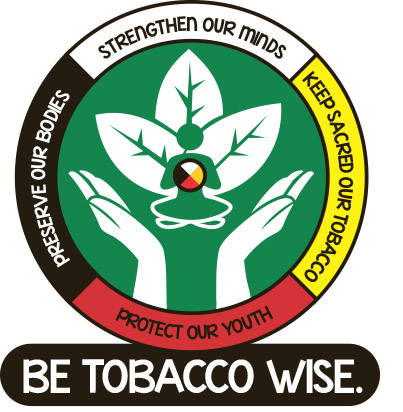Dilico Anishinabek Family Care unveil new logo

By Rick Garrick
THUNDER BAY — Dilico Anishinabek Family Care announced the unveiling of a new logo featuring the traditional use of sacred tobacco for the education of youth on Nov. 27.
“We wanted to ensure our young people have information on the traditional uses of tobacco so they can make better-informed decisions later in life about how they are going to use tobacco,” says Tina Bobinski, acting director of Mental Health and Addictions at Dilico. “As well, we feel it is important to share knowledge about our traditional uses of medicines and how they are important and were used historically in promoting healing and wellness within our First Nations.”
Bobinski says there has been a positive reaction from the community about the new logo.
“I think the kids definitely weren’t aware of how their ancestors used tobacco and tobacco’s role in promoting wellbeing within community,” Bobinski says. “The kids were really excited to create the logo because they wanted to share what they had learned with other youth in the community, other members of our community.”
Bobinski says the initiative also provided a building of identity among the youth by providing them with more information on the history, traditions, customs and values of First Nations people. The youth worked with teacher Sergio Pasciullo to create the logo and determine its purpose.
“And in a real-life sort of way being able to help them incorporate those histories and their identity into their future, into their thinking, into their being,” Bobinski says. “The youth were provided a series of teachings with some cultural people within the organization on tobacco and on traditional healing within their classroom. Part of that learning was about the Medicine Wheel and the four directions and that tobacco sits within the four directions as one of our primary medicines.”
The logo initiative was supported through a Northwest Tobacco Control Area Network funding grant aimed at encouraging youth to make healthier choices in life as well as by the Mazinaajim Children’s Foundation.
“It is really important for Dilico Anishinabek Family Care to continue to provide these kinds of educational opportunities for children and youth in our community,” Bobinski says. “Providing them with knowledge of First Nations traditional ways of being will help them make informed decisions about how they use tobacco and how they promote their own identity and wellbeing in the future.”
The Mazinaajim Children’s Foundation also provided funds and donated hockey equipment for the students to create a new floor hockey program in the Dilico gym where the logo was installed.
“The students are playing hockey right within the gym and are able to see the logo,” Bobinski says. “As well, we had the logo imprinted on the team jerseys and the students wear the jerseys while they are playing hockey.”
Bobinski says the logo is a conversation starter.
“There is a lot of value in the way in which we share information and one of those ways is through art,” Bobinski says. “[By] creating this art logo and then promoting it by putting it on the jerseys and toques and hats within spaces where kids can play and do healthy activity, I think that students and other people in the community are going to start asking questions: ‘Hey, what is that about? What is this logo? What does it mean?’ And this is then the students’ opportunity to share the knowledge they received with the traditional teachers and promote the historical ways in which tobacco is used.”
Dilico provides Health, Mental Health and Addictions, and Child Welfare services in the Thunder Bay region, including eight Northern Superior Region communities.


